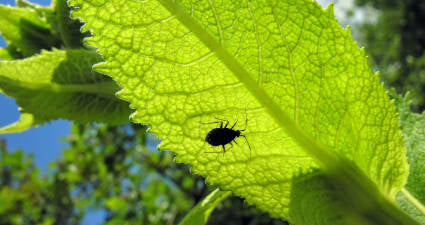
Common Garden Pests
Share
The benefits of maintaining a garden are immense. Meticulously tending it, watching it flourish, and enjoying the blooms along with the wonderful creatures they attract brings tremendous satisfaction. Certain flowers attract hummingbirds while others attract deer. However, a lush garden will also attract unwanted pests. Following is a list of pests and remedies on how to evict them from your garden.
The usual culprits:
Red Spider Mites
If your plants are yellow and weak chances are they are afflicted with red spider mites. If not evicted, these pests will suck the life out of your plants. These mites are barely visible to the naked eye and appear as reddish or greenish spots on and under leaves and stems. Preferring temperate climate, they spin their webs on and under leaves. It is their webs you will probably notice first along with the telltale yellow spots on your plants’ leaves.
Aphids
Aphids are small sap-sucking insects that are most active in the springtime. They weaken your plants by sucking the sap. If they have infested your garden you will notice holes in your plants’ leaves or along the leaf margins. You may even spy the culprits thriving along the stems.
Spittlebugs or Froghopper
These relatives of aphids are famous for their nymphal stage which produces a cover of foamed-up plant sap that looks like saliva. The adults can propel themselves up to 100 times their height and length. If the infestation of these critters is big they will suck the sap from your plants and stunt their growth.
White Fly
These tiny, white triangular shaped insects are formidable pests that suck plant juices producing a sticky substance known as honeydew. Left untreated, honeydew can afflict your plants with fungal diseases. Your plants will weaken rapidly and render photosynthesis impossible.
The remedies . . .
There are several ways to send these pests packing. The simplest of which is to spray them off with water using a hose with a strong spraying nozzle. Give special focus to the underside of leaves where they tend to take shelter. Spray early in the morning or later in the day when the temperature is cooler.
Neem oil is highly effective in preventing pests from taking hold. It repels them impeding their ability to feed. This method takes two weeks of diligent spraying with special focus to the underside of leaves.
Insecticidal soaps, such as Safer’s Soap, is another effective two-week remedy. Instead of repelling the pests, it smothers them. With continued spraying, soap will dry out the insects’ bodies and terminate them.
Handpicking the larger insects is effective provided you have the time and the patience for it. You can prevent infestations in the first place by keeping your garden pristine: free of weeds, well watered, and stocked with high quality, parasite-free plants.